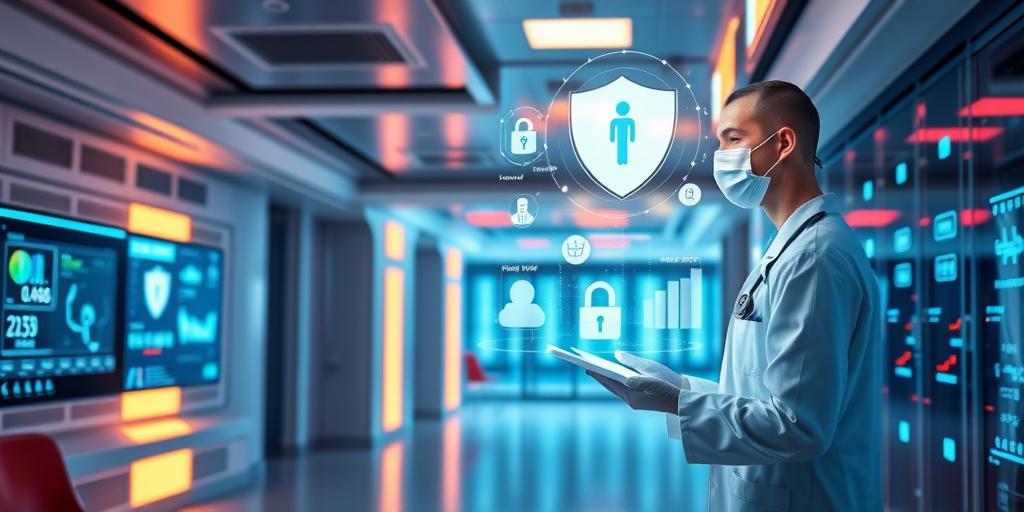The healthcare industry is undergoing a rapid digital transformation, with electronic health records (EHRs) and other digital tools becoming increasingly commonplace. While these advancements offer significant benefits for patient care and efficiency, they also present new cybersecurity challenges. As healthcare organizations embrace technology, protecting sensitive patient data becomes paramount. This is where cybersecurity healthcare plays a crucial role in safeguarding patient privacy and ensuring the integrity of medical information.
The Evolving Landscape of Healthcare Cybersecurity
The Growing Threat to Patient Data
The healthcare industry is a prime target for cybercriminals due to the sensitive and valuable nature of patient data. Social Security numbers, medical records, and financial information are all highly sought after by malicious actors. The rise of ransomware attacks, where hackers encrypt data and demand payment for its release, has further heightened security concerns.
The Impact of Digital Transformation on Healthcare Security
The increasing use of connected devices, cloud computing, and mobile applications in healthcare has created new attack vectors for cybercriminals. Hospitals and clinics need to adopt comprehensive cybersecurity strategies that can address the evolving threat landscape and protect their systems and data from unauthorized access.
Key Cybersecurity Challenges in Healthcare
Data Breaches and Their Consequences
Data breaches in healthcare can have devastating consequences, both for patients and for healthcare organizations. A breach can lead to identity theft, financial loss, and reputational damage. Moreover, the legal and regulatory ramifications of a data breach can be significant, with hefty fines and penalties imposed by authorities.
The Rise of Ransomware Attacks
Ransomware attacks are a growing threat to healthcare organizations. These attacks can cripple hospital operations, disrupt patient care, and result in significant financial losses. Hospitals are particularly vulnerable to ransomware because they often rely on critical systems for patient care, such as imaging equipment and electronic medical records.
The Human Factor in Cybersecurity
Human error is a major contributing factor to cybersecurity incidents. Phishing attacks, where attackers use deceptive emails to trick users into giving up sensitive information, are particularly effective in healthcare. Training employees on cybersecurity best practices and raising awareness about potential threats are crucial for mitigating this risk.
Strategies for Enhancing Healthcare Cybersecurity
Implementing Robust Security Measures
Healthcare organizations need to implement robust security measures to protect their systems and data. This includes:
Multi-Factor Authentication
Multi-factor authentication (MFA) adds an extra layer of security by requiring users to provide two or more forms of identification before accessing sensitive data. This can help prevent unauthorized access, even if a password is compromised.
Data Encryption
Data encryption is another essential security measure. It converts data into an unreadable format, making it impossible for unauthorized individuals to access or understand. Encryption can protect data both at rest (stored on devices) and in transit (sent over networks).
Regular Security Audits
Regular security audits are essential for identifying vulnerabilities and weaknesses in healthcare systems. These audits should be conducted by qualified cybersecurity professionals who can assess the organization’s security posture and recommend improvements.
Raising Cybersecurity Awareness Among Healthcare Professionals
Healthcare professionals play a vital role in maintaining cybersecurity. Training them on best practices, such as recognizing phishing emails and using strong passwords, can significantly reduce the risk of human error. Regular security awareness campaigns can help keep employees informed about the latest threats and how to protect themselves and the organization.
Leveraging Advanced Technologies
Advanced technologies can enhance healthcare cybersecurity and help organizations stay ahead of evolving threats.
Artificial Intelligence (AI) for Threat Detection
AI-powered security solutions can analyze vast amounts of data to detect suspicious activity and identify potential threats. AI can also be used to automate security tasks, such as patching vulnerabilities and monitoring network traffic.
Blockchain for Secure Data Sharing
Blockchain technology can be used to create a secure and transparent system for sharing patient data. This can help improve patient care by providing healthcare providers with access to comprehensive medical records while ensuring the privacy and security of the data.
The Future of Healthcare Cybersecurity
Emerging Threats and Innovations
The cybersecurity landscape is constantly evolving, and healthcare organizations need to be prepared for emerging threats. This includes threats from artificial intelligence (AI) and the Internet of Medical Things (IoMT). Innovations in cybersecurity, such as zero-trust security and quantum computing, are also emerging and have the potential to transform how healthcare organizations protect their data.
The Role of Collaboration and Partnerships
Collaboration and partnerships are essential for enhancing healthcare cybersecurity. Healthcare organizations should work together to share best practices, threat intelligence, and resources. Partnerships with cybersecurity vendors and government agencies can also provide access to expertise and support.
The Importance of Continuous Learning and Adaptation
The healthcare industry needs to embrace a culture of continuous learning and adaptation when it comes to cybersecurity. This means staying informed about the latest threats and vulnerabilities, updating security measures regularly, and investing in cybersecurity training for employees.
By taking a proactive approach to cybersecurity, healthcare organizations can protect patient data, maintain the integrity of their systems, and ensure that patients receive the highest quality care. This includes implementing robust security measures, raising cybersecurity awareness among employees, and leveraging advanced technologies. The future of healthcare cybersecurity is bright, but it requires a commitment to continuous learning and adaptation to stay ahead of the evolving threat landscape.




